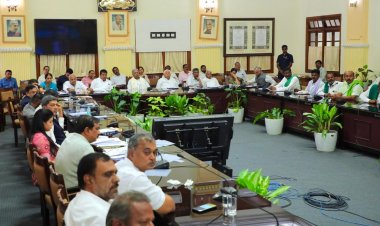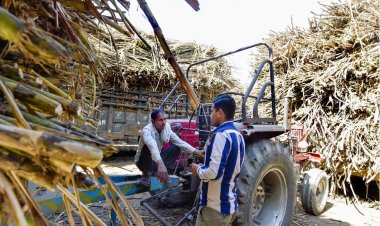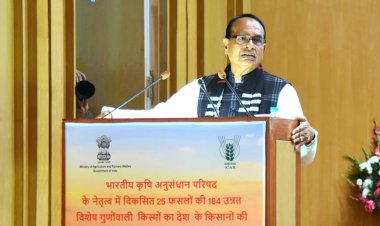Delay in sugarcane SAP and pending dues anger farmers, movement against farm laws intensifies in UP
The delay in announcing the State-Advised Price (SAP) for sugarcane by the BJP government in Uttar Pradesh (UP) led by Chief Minister Yogi Adityanath and that in clearing cane payment dues seem to be going in favour of the movement against the three farm laws brought in by the central government.
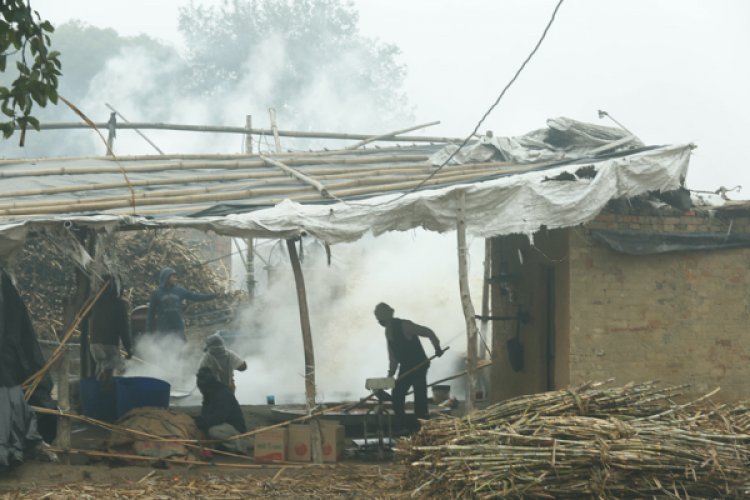
Sisauli, Muzaffarnagar
The delay in announcing the State-Advised Price (SAP) for sugarcane by the BJP government in Uttar Pradesh (UP) led by Chief Minister Yogi Adityanath and clearing of cane payment dues by mills seem to be strengthening the movement seeking repeal of the three Central farm laws. Sugarcane prices and payment arrears have always been a major issue for farmers in UP. It was precisely to cash in on grievances on this count that Narendra Modi, as the BJP’s prime ministerial candidate in the 2014 Lok Sabha elections and in the UP Assembly polls three years later, had promised to strictly enforce the law requiring payment of SAP to be made within 14 days of cane delivery.
But the ground reality is otherwise – more than six-and-a-half years after Modi became PM and almost four years after his party assumed power in India’s largest state as well.
The Adityanath government is yet to fix the SAP for sugarcane for the 2020-21 sugar season (October-September). It has broken even the record that the previous Akhilesh Yadav-led Samajwadi Party (SP) government had established – of announcing the SAP for the 2015-16 season only on 18 January, 2016. This even as cane payment of sugar mills, including from the 2019-20 season, have mounted to over Rs 11,000 crore.
The discontent among sugarcane farmers – the SAP of cane has also been increased by a paltry Rs 10 per quintal under the Adityanath administration – has fuelled support for the ongoing protests against the Modi government’s farm laws that, on the face of it, have little to do with their main crop. That many thousands of farmers from West UP’s sugarcane heartland are going to Delhi’s border to participate in the proposed tractor parade on Republic Day is clear from voices from the ground. Rural Voice travelled to villages in Meerut, Baghpat, Muzaffarnagar and Shamli districts to capture this sentiment
Farmers in this sugarcane belt of western UP grow this crop on more than 70 per cent of the land. But the state government is yet to fix the SAP for the current crushing season (2020-21). As a result, thay are writing “zero” against the SAP and total price of the sugarcane being delivered by the farmers. Although the state government is not issuing any official data, 420 lakh tonnes (lt) of sugarcane has been delivered in the state up to 14 January, 2021, as per records available. This translates to payments of Rs 13,468 crore on the basis of the SAP last year. Of this, payments of Rs 4,132 crore have been made, as per the data on the above date. That leaves Rs 9,336 crore as payments due. Compared to this, farmers had delivered a supply of 1,118 lt sugarcane to the sugar mills last season (2019-20) and the payments for this translated to Rs 35,899 crore. Of this, Rs 2,018 crore was due till January 14. Thus the total payments due to the farmers from the sugar mills, as of 14 January, 2021, is Rs 11,354 crore. Add Rs 750 crore of interest to what was due last year and the total payments due go up to Rs 12,104 crore. The dues for last year, interest included, is Rs 2,768 crore.
As per the information on the website of the Sugar Industry & Cane Development Department of the Uttar Pradesh Government till 18 January, 2021, payments for the last season have gone up to Rs 34,050 crore. Going by this figure, the amount due for last year comes to Rs 1,849 crore. As per the department, the payments made for the current season have also gone up to Rs 4,448 crore. However, it is not possible to calculate the exact amount due on this date for want of availablity of detailed data up to January18.
SUGAR CANE – S. A. P – U. P.
|
YEARS |
S.A.P |
INCREASED IN Rs. |
INCREASE IN PERCENTAGE |
DECLARED MONTH |
STATE GOVT. |
|
|
|
2007-08 |
125 |
00 |
|
|
BSP |
MAY-2007 |
|
|
2008-09 |
140 |
15 |
12 |
|
BSP |
TO MARCH |
|
|
2009-10 |
165 |
25 |
18 |
OCT-09 |
BSP |
2012 |
|
|
2010-11 |
205 |
40 |
24 |
NOV-10 |
BSP |
INCREASED |
|
|
2011-12 |
240 |
35 |
17 |
NOV-11 |
BSP |
Rs-115 |
|
|
2012-13 |
280 |
40 |
17 |
DEC-12 |
SP |
MAR-2012 |
|
|
2013-14 |
280 |
00 |
00 |
NOV-13 |
SP |
TO MARCH |
|
|
2014-15 |
280 |
00 |
00 |
NOV-14 |
SP |
2017 |
|
|
2015-16 |
280 |
00 |
00 |
JAN-16 |
SP |
INCREASED |
|
|
2016-17 |
305 |
25 |
09 |
NOV-16 |
SP |
Rs-65 |
|
|
2017-18 |
315 |
10 |
03 |
OCT-17 |
BJP |
MAR-17 |
|
|
2018-19 |
315 |
00 |
00 |
NOV-18 |
BJP |
|
|
|
2019-20 |
|
|
|
|
BJP |
|
|
|
|
|
|
|
|
|
|
|
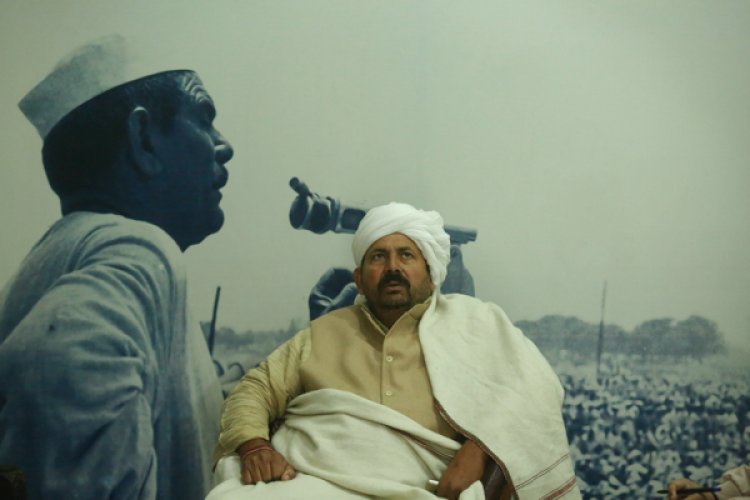
The sugar industry has no answer to why the state government has not announced the SAP for the current season so far. Neither is anyone in the government willing to comment on this. But the speculation is that the delay is due to the farmers’ movement. If the government goes for a small increase at this juncture, it may upset the farmers. But the truth is that the delay is adding to the discontent of the farmers.
Speaking of the current government and the two previous ones, we find that the least increase in SAP has been during the Yogi government’s tenure. When the Bahujan Samaj Party (BSP) government of Chief Minister Mayawati came to power in 2007, the SAP for sugarcane was Rs 125 per quintal in the state. But it went up to Rs 240 per quintal during her tenure. Which means her tenure witnessed an increase of Rs 115 per quintal. Whenever there was an increase in SAP during Mayawati years, it ranged from 12 to 24 per cent. The Akhilesh Yadav government, which came to power in 2012, increased the SAP twice and the price went up to Rs 305 — an increase of Rs 65 from what it was in the previous regime. However, it kept the SAP unchanged for three years. The two increases were 9 per cent and 17 per cent respectively. But contrary to these two governments, the current BJP government increased the SAP only once in 2017-18 season by Rs 10 per quintal, which comes to 3 per cent approximately. There has been no change in the SAP in the two subsequent seasons. The SAP for the current season is yet to be announced. This would be record delay in the announcement of SAP.
On the farmers’ movement and on the issue of sugarcane, Amit Malik, a 40-year-old from Kharad village in Muzaffarnagar district who has a landholding of 12 bighas, says, “We are already under the contract farming law, which farmers in Delhi are protesting. It’s the sugar mill companies that decide the cane seeds to be used and they then decide when we’ll supply them the cane. We don’t even decide the price. When they will pay subsequently is also for the mills to decide. For the sugarcane that I sold to Bhainsana sugar mill of the Bajaj Group last season, I have received payments only up to March. This too has picked up only over the last month. Even as I have supplied 240 quintals in the current season, I don’t even know what price I’ll get and when I’ll receive the payments.” Adds Malik, “The protests against the (farm) laws are intensifying because we are witnessing in sugarcane the kind of exploitation contract farming may lead to. So, all of us are joining the protests. I have been to Ghazipur myself and now my brother has gone there.” This is what Sanjeev, a farmer from Satwai village in Meerut district, also reiterates. Rajkumar Guddu, a farmer from Banat village in Shamli district, also spoke on similar lines. Farmers here show evidence of “zero” written on the receipt for cane price and its total payments.
Says Dhiraj Malik, a farmer from Laank village, “The electricity rates in the state have gone up from monthly Rs 100 per Horse Power (HP) to Rs 175 per HP during the tenure of the present government, which has nearly doubled our electricity bills. Diesel price has also shot up by nearly 20 rupees a litre.”
Jaykumar Singh, a farmer from Alawalpur Majra village, says, “The advent of the new CO 0238 variety of cane has increased the sugar recovery of sugar mills by up to two per cent, but this variety is prone to diseases, which has led to a huge increase in expenditure on pesticides. The cost of harvest of cane has reached Rs 40 to 50 per quintal. This increasing loss is aggravating our crisis. We have to use three pesticides for this variety while the need for pesticide for earlier varieties was almost negligible.”
These sugarcane-related issues are strengthening the farmers’ movement. A panchayat had been called at the BKU headquarters in Sisauli on January 17 to enhance the farmers’ participation in the movement and to prepare for the proposed tractor parade of farmer organisations on January 26. In an interview given to Rural Voice before the panchayat, Naresh Tikait, the BKU national president, says that the attitude of the government is fuelling the discontent of the farmers. Says he, “A king (ruler) should not be obdurate. The farmers’ protest and movement should lead to the repeal of the three new farm laws by the government. The government should not be obstinate.” Citing the example of Sir Chhotu Ram, who protested the 1943 decision during the British rule that imposed a ceiling on wheat prices, he says, “When the British government fixed the price at five rupees a maund (a unit of weight which is approximately 40kg), Sir Chhotu Ram had said that the farmer would settle for nothing less than 10 rupees a maund, and if the government did not accept his demand, he would rather set fire to the standing wheat crop than sell it to the government at a low price. Bearing in mind the farmers’ movement, the British government acceded to their demand and fixed the price at 10 rupees a maund. Now that the government is ours, it should not be so obstinate. The farmers will reach Delhi in huge numbers on January 26.” Naresh Tikait is the chaudhary (head) of the Baliyan khap, which includes 84 villages from Muzaffarnagar and Shamli district. Tikait says that if the government does not accede to the demands this will aggravate BJP’s problems. The biggest issue is that of the honour of the farmer.
People from khaps other than Baliyan khap were also present at the BKU panchayat on Sunday and people reached Sisauli on hundreds of tractors. Yashpal Banji, the former chairman of Sisauli Nagar Panchayat, said, “We had supported the BJP in the Lok Sabha elections. About 8,500 votes were cast here, of which 5,500-odd went to the BJP. (But) this is farmers’ issue and we won’t support the BJP on this.” Neeru Devi, the wife of Yashpal Banji, is the current chairman of the Sisauli Nagar panchayat. Chand Singh Baliyan, a 72-year-old farmer also from Sisauli, says, “I had gone to Chaudhary Mahendra Singh Tikait’s movement also at the Boat Club in October 1988, but this movement is bigger because it consists of farmers from states other than UP as well. I’ll go to the Delhi border on January 26 because this is a battle for our identity.”
Bhanwar Singh Tomar, a farmer from Hathchhoya village in Shamli district who came to the panchayat, says, “There was a march of 1500 tractors at the Shamli district headquarters a day earlier. We’ll reach Delhi in still higher numbers.” He is the Saharanpur Mandal president of BKU. Farmers from Des khap who are sitting on a dharna at Baraut in Baghpat district say that more than two thousand tractors will go to Delhi from here on January 26. This claim is made by Sanjiv Chaudhary, son of Chaudhary Surendra Singh of Des khap. The Malakpur sugar mill located here is among those sugar mills of the state which delay sugarcane payments the most.
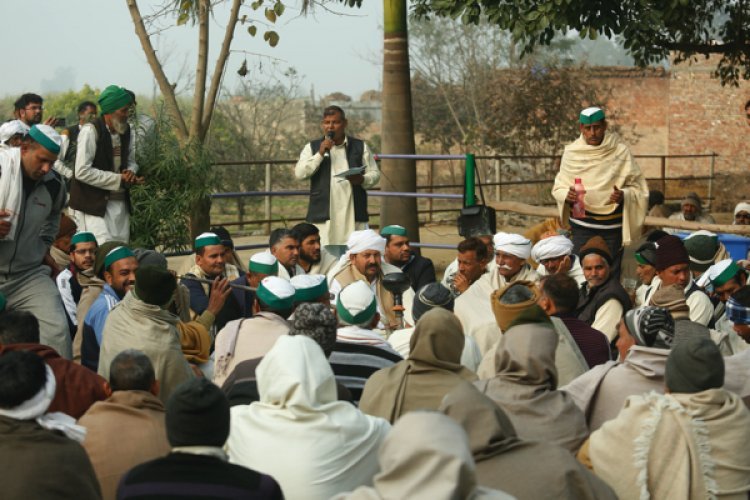
Thus, the delay in announcing sugarcane SAP, no increase in SAP for the last two years and the delay in payments and outstanding amounts for sugarcane are issues that are fuelling the farmers’ discontent and making them join the movement. Given the kind of preparation made by the farmers over this entire region, their participation in the movement and the tractor parade will create problems for the government. The longer the movement gets stretched, the greater the political loss for the BJP in the state. For, the farmers’ discontent is turning into anger.



 Join the RuralVoice whatsapp group
Join the RuralVoice whatsapp group



















